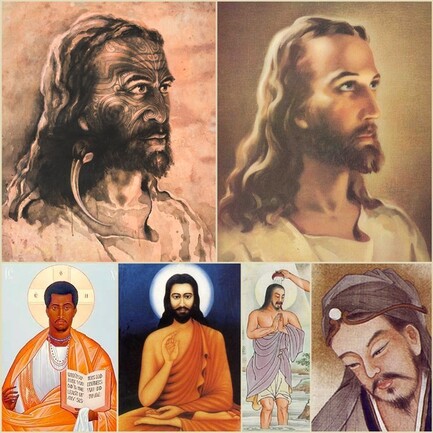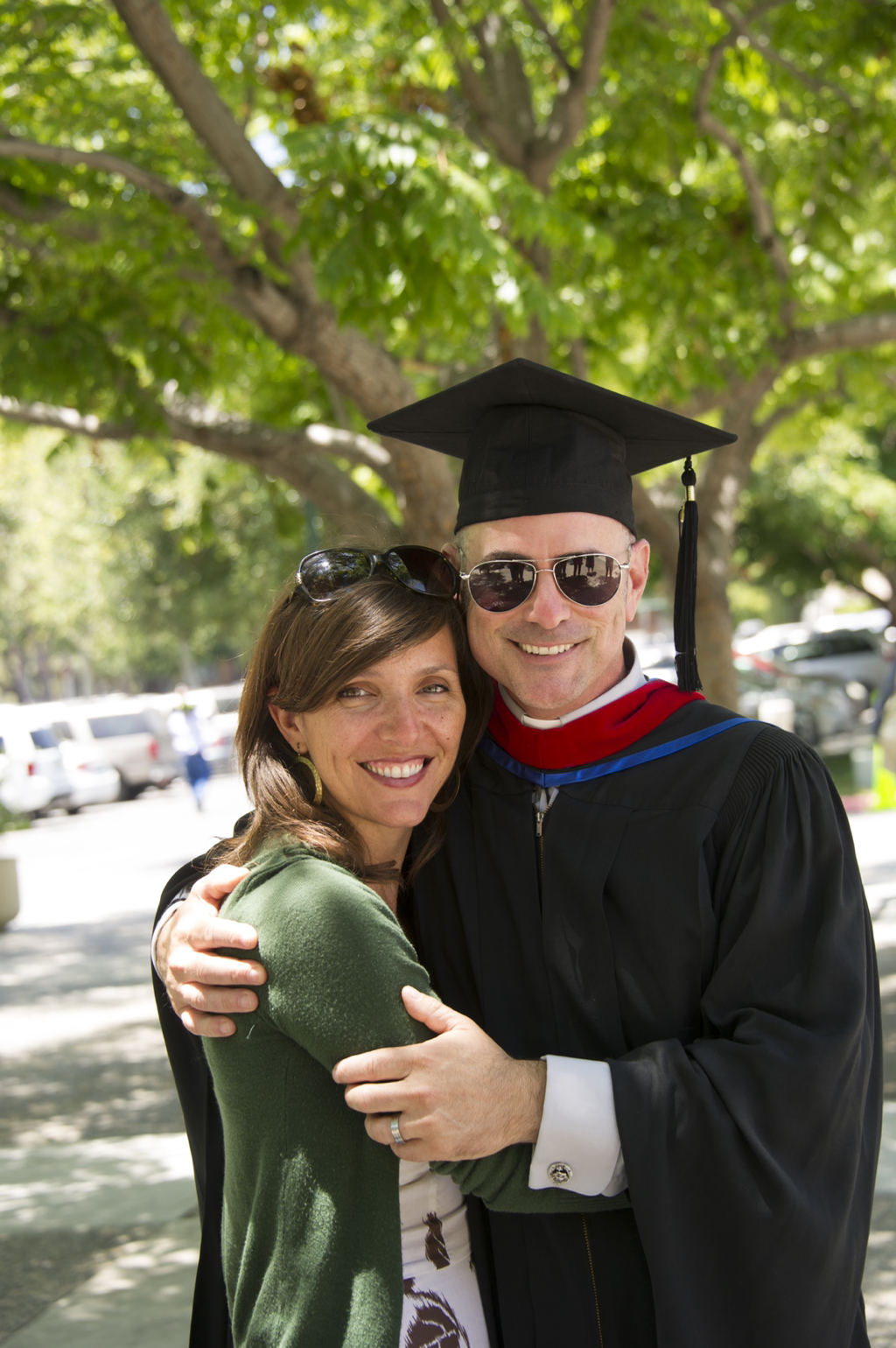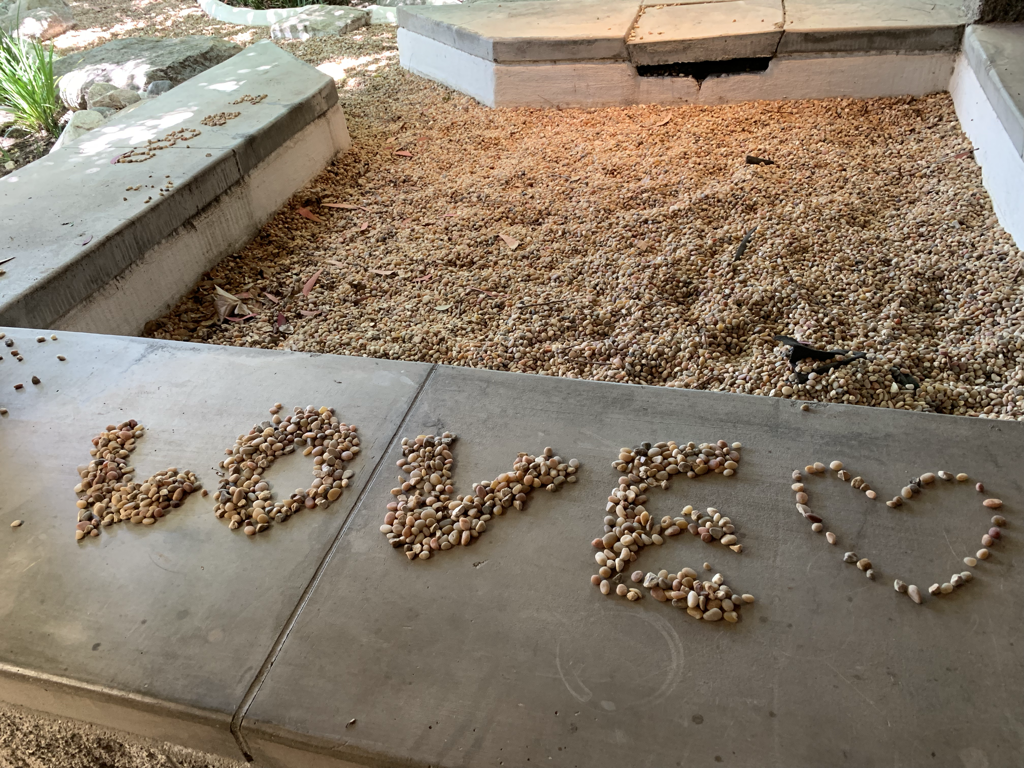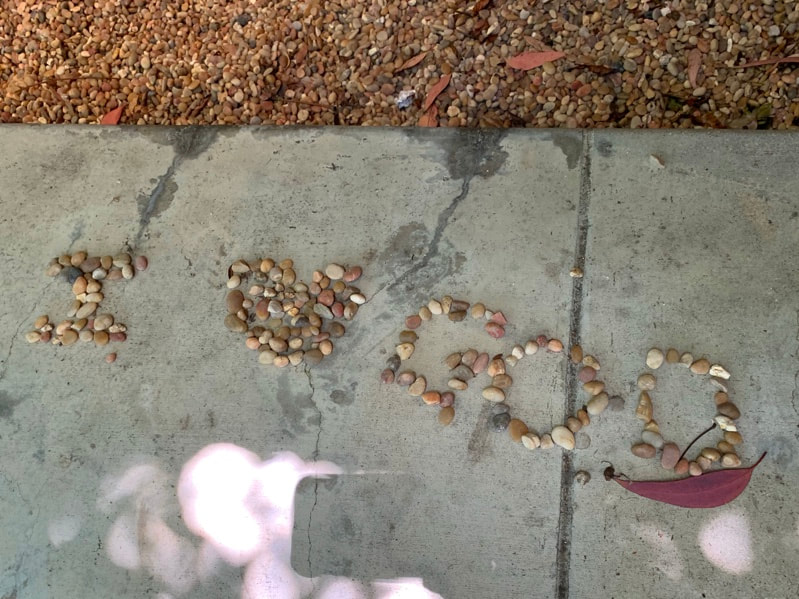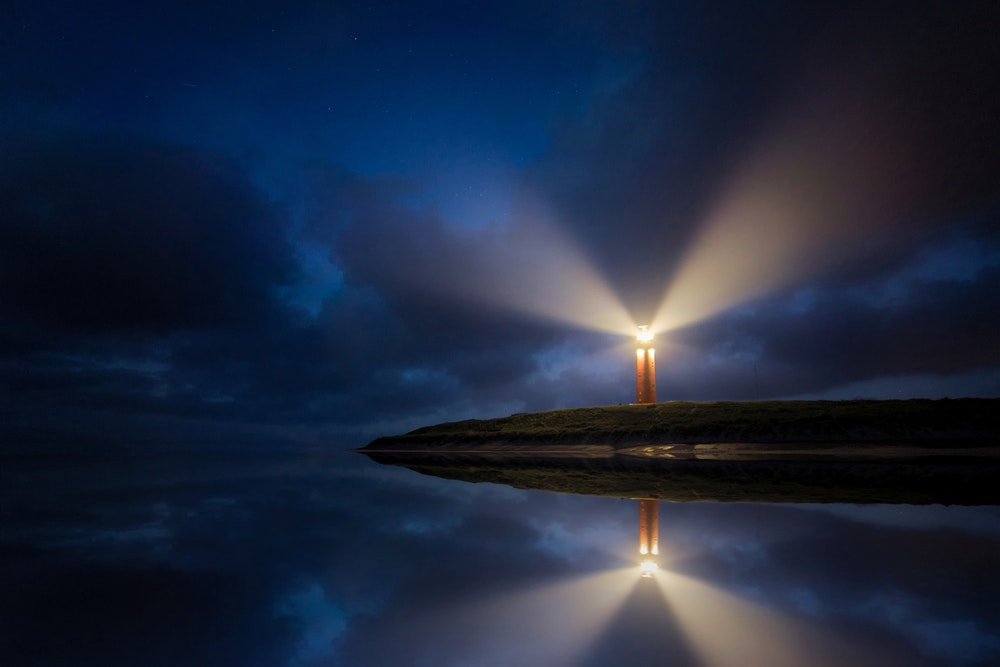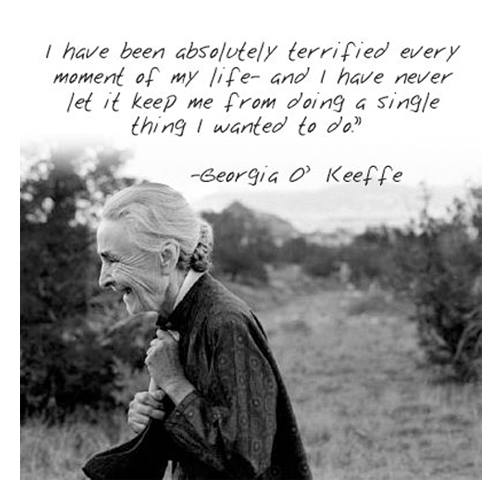Ok, So Jesus is the fulfillment of God’s promise to all creation. He befriends us and pushes us to be our best so that we can see the divine promise, the splendor of God’s love arrive in full-force. But I think There's More to it.
I’m also curious how the subject came up in conversation? Did they see shrines to the Greek god Pan (who was from this area) or an image of Augustus Caesar, who brazenly called himself the Son of God? Did someone mumble something under his breath as they walked by? Or did one of the twelve make an off the cuff comment that sparked Jesus to ask them, “who do those people say that I am?”
This is a legitimate question. Jesus had become a well-known figure. His Insta followers are through the roof. And Twitter blows up whenever he posts where he’s going to be showing up next. Jesus was the first social influencer. This begs the question, who did the crowds think they were going to go see? It’s not 100% clear. Some thought he was John the Baptist, others thought one the great prophets from their past. Following Dr. Younger’s method, I decided to put myself into this story, which is recorded in all four gospels. I picture the landscape, the weather, the sounds and smells, and what Jesus’ voice sounds like when he asks me “Who do your Facebook friends say that I am?” Do I tell him that some say he’s a great teacher? Or that others believe he is a wise and deeply religious man, like Moses or Buddha? Do I let him know that some of my friends know his name… but only as an exclamation point. I imagine Jesus already knows these things. And that’s why, in my version of the story, Jesus turns the question to me. “But Ian, who do you say that I am?” Answering this question is the main objective of the Christian Church. And our individual answer is absolutely paramount to sharing God’s redemptive plan throughout the world. I have to really think about this before I speak. We don’t know how the other disciples answered. We only have Peter’s confession, “You are the Christ.” And that is enough. His four simple words would become the very foundation of Christian faith – impacting and transforming the heart of all that is seen and unseen.
watch sermon here
The Christ has deep, historical roots in Judaism. And even if Peter didn’t fully realize what he was saying, he believes in his heart that Jesus is the fulfillment of God’s redemptive glory, the promised One who invites us to dwell in God’s eternal kingdom. For two millennia the Church has stood solidly upon this divine affirmation: that Jesus is the Christ, the Son of God, our Lord and King of all salvation. Today, we affirm this by bearing witness to its truth.
Which takes me to the story Dr. Younger told. It’s about a minister who, after 40 years at the pulpit, decided to retire. For his last sermon, he didn’t talk about Jesus in the doctrinal sense but chose instead to tell his congregation what Jesus meant to him personally. It was a powerful sermon that had left many people crying. And one person very upset. Betty Durant was often quiet, but on this particular Sunday she had no problem giving that old pastor a piece of her mind – letting him know how disappointed she was that he waited so long to share his real love for Jesus. This got me thinking, maybe I shouldn’t wait so long to answer Jesus’ question. “But who do you say that I am?” Jesus, You are my oldest and dearest friend. The one I can always count on. We’ve laughed our butts off and cried our eyes out. We’ve wasted days wandering aimlessly in strange places, and spent many a nights under the stars pondering existential questions. You hold all my secrets and know me better than anyone. You don’t judge me when I make mistakes because you know my heart’s in the right place even when my selfish desires aren’t. No matter how badly I wrong you, you’ve never abandoned or betrayed our friendship. You’re quick to forgive and you forget even quicker. You accept me for who I am, and you love me unconditionally because that’s what friends do. Best of all, you’re never too busy to play with me. As a friend, Jesus represents God’s steadfast love, and all the joys such love is able to manifest in the world. But Jesus, you’re also my coach. You push me to be my very best self, even when it means I have to run a little further than I want to, jump a little higher than I can, or do spiritual burpees that make me want to avoid seeing you. You encourage me to never give up. You taught me how to live a godly life by exemplifying that life for me to emulate. When I walk with you, I learn how to live well, love better, and nurture my relationships in more meaningful ways. As a coach, Jesus represents God’s challenge for us all. He pushes us to be our best, and transforms us in such a way that others are able to see God’s will and learn to do the same. But more than my friend and coach, you Jesus are my hope. With you I know that no matter how difficult today is, tomorrow will be better. You know what it’s like to be abandoned, hungry, tired, betrayed, frustrated, disappointed, rejected, and angry. And yet you remained true to who God called you to be. The Christ! You are my hope, my assurance that God’s love is stronger than my sin. Because of what you did for me on the cross, I too will see the kingdom of God in all its glory. Jesus is the fulfillment of God’s promise to all creation. He befriends us and pushes us to be our best so that we can see the divine promise, the splendor of God’s love arrive in full-force. Jesus walks with us, looks out for us, helps us, forgives us and makes everything worthwhile. He holds our hand, and never lets go. He is always there, and never leaves us alone. He loves us, no matter what. This is the good news we are called to proclaim to the ends of the earth. That God’s love has been fulfilled in Jesus the Christ. But do we? Do we proclaim this truth in our homes, workplaces, or social groups? When was the last time you told someone what Jesus means to you, and what your personal life has been like with him at the wheel? I fear we’ve become complacent - relying on someone else’s confession of Christ to speak for us. It’s like describing American history by telling someone about the movie Forrest Gump. We don’t need to be afraid to testify to God’s glory, and to do so by acting on God’s behalf – sharing God’s love with those in our neighborhoods, workplaces, and social communities. In fact, if we dare to call ourselves Christians then must be willing to bear witness to Christ’s name in all that we do…big and small. Why is this important? Just look at your Facebook feeds, or your news feeds, or the world around you as you drive through your town and cities. There is a darkness on our hearts that’s crying out for light. Real people in real pain, in need of spiritual healing and peace. Just as the world needs the Christ to come to its rescue and healing…so too does the Christ need us to be the conduit by which God’s love and healing is administered. By our words and deeds, we become both individual testifiers within a community, and a community that testifies to the life-giving, transformative gospel of God’s love and grace made manifest in the world through Jesus Christ…my friend, my coach and my hope. Jesus will lead anyone who desires to follow him through the darkest days and down the narrowest of paths…to the joy of eternal salvation. So as you leave here today, I hope that you will take the time to answer Jesus’ question – to honestly think about how Jesus has transformed the way you live...because you know his truth. As you work through this, remember that it’s not about getting the doctrine right, but about knowing the true story that God has written on your individual heart. That Jesus is King of kings. Lord of lords. The One who gave up his life so that you could live, abundantly and freely. Now and forever, Amen. Work Cited Bartlett, David L., Barbara Brown Taylor, eds. Feasting on the Word, Year A, Vol. 3. Louisville:Westminster John Knox Press (2011), pp. 380-85.
0 Comments
“A pilgrim preaches the gospel by living it day by day, hour by hour, minute by minute. For what is he really about, this pilgrim of mine? He is preaching the gospel with his life. His pilgrimage has to reflect this.”
Excerpt from the book: Strannik: The Call to the Pilgrimage of the Heart by Catherine Doherty “People of prayer are, in the final analysis, people who are able to recognize in others the face of the Messiah. They are people who make visible what was hidden, who make touchable what was unreachable. People of prayer are leaders because precisely through their articulation of God’s work within themselves they can lead others away from confusion and toward clarification; through their compassion they can guide others out of the closed circuits of in-groups and toward the wider world of humanity; and through their critical contemplation they can convert convulsive destructiveness into creative work for the new world to come.”
Henri Nouwen Text excerpts taken from "You are the Beloved" by Henri J.M. Nouwen. © 2017 by The Henri Nouwen Legacy Trust. Published by Convergent Books. For some reason I wrote this post below in a text to someone whose heart and struggle I share. It just came out. Maybe feeing hopeful or grateful or just simply needed to feel not so alone. Five years ago I graduated from seminary. Tomorrow will mark my fifth year of my ordination into ministry.
In this time I have been burnt by two churches I served faithfully, rejected by three churches I applied to, and turned down an offer to another church because when they didn’t think I was watching I saw who they really were. And to be honest, I didn’t want to be burnt or let down again. I have also started a church in my backyard. And I have quit that church more times than I can count. For over two years I have struggled to get it off the ground and a day doesn’t go by where I feel as if I am failing. I often daydream about being somewhere else, doing anything but this. Yet here I am. Some call me committed. Others believe I should be committed. The anxiety that causes my heart to pound in my head deafens their critiques. Still I am my harshest critic. My best worst enemy. Yet, for some unexplainable reason my faith is stronger than ever. My hope remains unsinkable. And eyes remain open so my heart can see, feel, and simply be love. And not just any kind of love, but a part of a greater, more mysterious divine sensation I constantly fail to adequate or fully describe. This is what keeps my heart beating when I pray for it to stop. This is what gets me out of bed, to move through this bleak and broken world to help at least one person a day feel the love I feel. This is what gets me to write out words of confession. This is what pushes me to look beyond my fear, my anxiety, and my inabilities so that I might be able to leap into the uncomfortable and dark unknown. Some call it faith. Others call it foolishness. I call it my life. And I am grateful (even if I am often miserable) to share every heartbeat with you. The third [revelation] is that our Lord God, almighty wisdom, all love, just as truly as [God] has made everything that is, so truly [God] does and brings about all that is done . . . we are securely protected through love, in joy and sorrow, by the goodness of God. . . . All shall be well, and all shall be well, and all manner of things shall be well. —Julian of Norwich Pierre Teilhard de Chardin (1881–1955), a French Jesuit priest who trained as a paleontologist and geologist, boldly declared love is “the very physical structure of the Universe.” That is a very daring statement, especially for a scientist to make. Teilhard argues that gravity, atomic bonding, orbits, cycles, photosynthesis, ecosystems, force fields, electromagnetic fields, sexuality, human friendship, animal instinct, and evolution all reveal an energy that is attracting all things and beings to one another, in a movement toward ever greater complexity and diversity—and yet ironically also toward unification at ever deeper levels. This energy is quite simply love under many different forms. Franciscan priest and scholar Richard Rohr describes Teilhard’s theory like this, “Love, the attraction of all things toward all things, is a universal language and underlying energy that keeps showing itself despite our best efforts to resist it. It is so simple that it is hard to teach, yet we all know love when we see it.” Love is the basis of all things. St. Paul wrote, “Without love I am nothing...” After all, as Rohr so aptly points out, there is not a Native, Hindu, Buddhist, Jewish, Islamic, or Christian way of loving. There is not a Methodist, Lutheran, or Orthodox way of running a soup kitchen. There is not a gay or straight way of being faithful, nor a Black or Caucasian way of hoping. We all know positive flow when we see it, and we all recognize resistance and coldness when we feel it. All the rest are mere labels. One label that seems to be a constant, and one that always seems to unarguably stick is this: God is love. St. Paul makes this bold statement in 1 Corinthians, but somewhere between reading this passage at wedding ceremonies and funerals we miss his powerful point. Paul sees love in all things, and equates it to God because he has a closeness to his Creator and a relationship with God through Christ that only love is the only word that suffices to describe it. Paul is not simply speaking about the emotional feelings we have for one another but the bond between Our Creator and all creation. I invite you to replace the word “love” with the word “God” to get a sense of how big Paul’s declaration really is: “Love is patient and kind; love does not envy or boast; it is not arrogant or rude. It does not insist on its own way; it is not irritable or resentful; it does not rejoice at wrongdoing, but rejoices with the truth. Love bears all things, believes all things, hopes all things, endures all things. Love never ends.” (1 Corinthians 13:4-8 ESV) That bond of love is what unifies each of us to our Creator and to every thing in creation. Rohr concludes, “When we are truly “in love,” we move out of our small, individual selves to unite with another, whether in companionship, friendship, marriage, or any other trustful relationship.” He gives the example of someone deliberately befriending a person standing alone at a party who is not attractive to you or with whom you have nothing in common. “That would be a small but real example of divine love flowing. Don’t dismiss it as insignificant. That is how the flow starts, even if the encounter doesn’t change anyone’s life on the spot.” Rohr, like Paul and Teirhard, look at Jesus in a particular light...the light of God’s love. It was Jesus, Divine Love manifested into human flesh, who invited us to cross the lines and tear down the walls that separate us so that Divine Love can be made manifest in us. With all the tribal divisions, elitism and our ego’s need to be superior and right, to name a small few, we seem to only limit Love to a thin, lower case word. We need to “move beyond our small-minded uniformity, we have to extend ourselves outward, which our egos always find a threat, because it means giving up our separation, superiority, and control.” How much is lost when we refuse to cross the “borders” that keep us apart? When we refuse to help or forgive or care for those who are part of us in creation? What does it say to the limiting power of lowercase love? And how does it reject Divine Love? How much are the people for whom Christ died suffering because we remain paralyzed and divided by our differences when we should be working together as the hands and feet of Jesus in the world? There must be a better and more efficient way to carry out our roles within the mission of God. Surely, we can do better.” - Christena Cleveland Work Cited:
Adapted from Richard Rohr, The Universal Christ: How a Forgotten Reality Can Change Everything We See, Hope For, and Believe(Convergent Books: 2019), 69-70. Julian of Norwich, Revelations of Divine Love, chapters 1 and 27 (Long text), trans. Elizabeth Spearing (Penguin Classics: 1998), 41, 79. Pierre Teilhard de Chardin, “Sketch of a Personal Universe,” Human Energy, trans. J. M. Cohen (Harcourt Brace Jovanovich: 1962), 72. Christena Cleveland, Disunity in Christ: Uncovering the Hidden Forces That Keep Us Apart (InterVarsity Press: 2013), 20.
When Sean was a little boy, he always had to have the lights on. The brighter the better. I swear his nightlight was bright enough to land a plane. It was so bright that one day a team from NASA came to investigate the strange illumination that they were seeing from space.
I used to think Sean needed that much light because he was afraid of the dark. But it turned out he just couldn’t see. He was in dire need of glasses. Turning on every light in the house helped him navigate his blurry world more clearly. To Jesus’ point, what good is a lamp if it’s not plugged in and turned on? Even people with perfect vision struggle to get around in the dark? Now there are basically three kinds of light: natural, artificial, and spiritual. Natural light is the physical source of all life. It was the first thing God did to interrupt the chaos of darkness. This light is essential to our existence. For example, the sheer miracle of photosynthesis is important to the plant which can take sunlight and turn it into a form of energy we can use, either directly by eating plants, or indirectly by eating something else that eats those plants. Natural light has the ability to penetrate the ground to give life to dead seeds. And it can bend and bounce across the universe to illuminate our side of the world long after we’ve turned away from the sun’s sight. Then there’s artificial light, like lightbulbs or candles. Until someone or something turns it on or lights its wick, they are not very useful. But when they are on, the to can be life giving and life saving. A flashlight can help us see our way out of a dark cave or through a dense forest at night. The beacon of a lighthouse can warn boats of impending dangers and lead ships safely to shore. And as Sean knows…a basic bright lightbulb can help us navigate words in a book, and expose dangers that might be hidden in the dark. Artificial light can change the way we see things. Take for example black light, which, when turned on, not only makes colors literally glow in the dark, but its ultraviolet rays expose stuff we would have never known were there. Like dandruff and lint on a shirt, or stains on your teeth. Police use these lights in crime scenes. And doctors use them to heal acne, kill fungus, and detect melanomas. But these things can only be done when the light is turned on. And then there is the spiritual light within us. Some might flicker brighter than others, but we all possess it. This light helps us see and understands the difference between good and bad, the metaphorical bright and dark side of our inner being. Spiritual light illuminates the positive when we’re stuck in the dark place of negativity, depression, fear, anxiety and grief. Such light radiates peace and hope when it seems all hope is lost. In the Bible Jesus is called the light, and “in him there is no darkness at all.” John says, “If we walk in the light as he himself is in the light, we have fellowship with one another…whoever says I abide in him, ought to walk just as he walked.” So as followers of his way, we are called to shine God’s love in the darkest of places. Just as it was in the beginning, the light of Christ interrupts the chaos of darkness, and darkness cannot over power it. When we walk in the light of Christ, we are able to see the glory of God shine all around us, even in those dark and cavernous places we sometimes stumble into. But what good is that light, Jesus asks, if it’s hidden or not turned on? ‘Elucean omnibus lux’— ‘Let the light shine out from all.’ The light of Christ is essential to our physical, mental, and spiritual wellbeing – it helps us see who we really are and what we are called to do.
Watch service here
With his rhetorical question, Jesus compares us to a lamp whose sole purpose is to illuminate the room. Jesus knew the typical household couldn’t afford to keep more than one or two lamps burning. So its position in the room was key to its effectiveness – you’d want it in the middle of the table or on the mantel. Not hide it under a basket or bowl.
In this parable Jesus reminds us that if the smallest of lamps can illuminate a room, then the light of a small or struggling disciple is enough for God to brighten up someone’s life – as long as it’s not covered up, or tucked away. “We are not hiding things, but bringing them out into the open.” We are the light of the world. Made in the image of the one who first made light appear with such a big bang that it forever changed the darkness. As Danny Gokey sings, “We were made to shine.” And when we shine like Christ all peoples and all nations can know of God’s grace and be transformed. In Sunday school I used to sing, “This little light of mine…I’m gonna let it shine.” But then I grew up and put that light away with the rest of my childhood. As I entered into the world on my own, I clothed and covered my faith with things that would help me blend in – instead of shine. And I was often left feeling lost and afraid. This is why the world needs our light. They need to see that our faith is real and authentic, and they need us to shine so they can be found and filled with God’s love…the hope and glory of God’s light. Like I said last week, Jesus isn’t asking you to be perfect. Just to be faithful to what God is calling you to do: shine with acts of love, mercy and justice. Because Jesus is the light of the world, we are able to see what he does and know that we can do the same. Like him, we too can illuminate the darkness for others to see God‘s glory… radiating in all things. Jesus does not tell us to go start a fire, or to burn bigger and brighter than others. He’s simply telling us to remove those things in our life that hide our light so we can shine. So I ask you this question: What are the baskets in your life? Fear, anxiety, shame, guilt? Could it be pettiness, jealousy, gossip? Are you holding onto some past resentment? Or maybe it’s anger, stubbornness, or pride? These aren’t qualities that radiate the light of Christ in you. They only obscure it. Thus Eugene Peterson stated in his Message translation, “Giving, not getting, is the way. Generosity begets generosity.” Martin Luther King so famously preached, “Darkness cannot drive out darkness. Only light can do that. Hate cannot drive out hate, only love can do that.” I received these words when I graduated from seminary. And in the same spirit I offer them to you, whether you’re graduating or simply struggling to live your best self. Your light, your love, your peace – as small or dim as it might seem to be – can overcome all the darkness of the world. Through Christ, God’s light is present and hard at work in you. So shine until the world is beaming and radiating the fullness of God’s glory. Throw off those bushels and baskets, pull your lamps out from under the bed and plug them in. Light up the world so it can be seen from space. And illuminate with such intense brightness that there will be no more need for sun or moon. Stand in the spotlight of God’s steadfast and never ending love…and let your goodness be seen until heaven and earth become one again. Amen. Work Cited Bartlett, David L. and Barbara Brown Taylor, eds. Feasting on the Word, Year A, Vol 1. [Westminster John Knox: 2010] p. 332-337. Jeffers-Schori, Katherine. Shine As The Light Of The World For God’s Glory. [episcopalchurch.org : Dec. 16, 2008] (Accessed on June 6, 2019.)
In front of me was a young couple. The guy put on a brave face for his date who shared my fear of heights. Having carefully navigated the first part of the course, she and I found ourselves together on a rather small platform of this particular “adventure.” The only way to get to the next set of stress tests was to strap ourselves to a very thin rope, and jump to the ground below.
This was something the young lady was not willing to do. So there we were, the two of us standing on a tiny platform facing our fear of heights and discerning our willingness to trust a piece of rope no thicker than a clothesline. On the ground her boyfriend made all sorts of promises to coax her and calm her fears. I did my best to help this frightened stranger, but next to pushing her off…I had nothing. Fear had gotten the best of her. And me. Long story short, she eventually closed her eyes and jumped. She floated gently into her boyfriend’s awaiting arms where she began to sob. It was a beautiful and heartwarming reunion. But here’s the kicker, I was next. And there were no arms waiting for me down there. Instead of gentle coaxing, I had my kids yelling at me to keep moving. I won’t tell you all the mean things they said, or how long I sat there, but I too eventually took that great leap. Just before my feet touched the ground, a great surge of life welled up in me. Which was just what I needed to take on the next set of challenges. Such is the world of faith. It can either scare you, or fill you with life.
The Hebrew word for faith is emunah, a verb that literally means, “to take firm action.” This is important to remember because Jesus is pushing us out into the chaos to continue his mission, which will require doing things that might seem impossible. To do this, we need to know exactly where our faith is. Is it shivering in the boat - afraid with the disciples? Or is it leaping boldly off the platform into the wild, raging waters?
Peter learned the hard way that God wasn’t testing his faith but pushing it to places where he would didn’t necessarily want to go – like to a rickety platform in the middle of the woods where he would have to face his fears, and trust that when he jumped God was jumping with him. Still, it shouldn’t surprise us that Peter hesitates and even doubts. It’s a natural response. He even questions Jesus, and that’s ok for us to do too. But when Peter is invited to join Jesus in the chaos, he goes for it. And as a result, he does the impossible. Faith can scare you, or it can transform and empower you. We all face that moment in life where we find ourselves on the edge. Some of us will jump fearlessly. But most of us will jump reluctantly, and with great doubt. As Peter demonstrated, both ways can lead us into a deeper relationship with God – strengthening our faith in the process. In their doubt and fear, the disciples were able to see who Jesus truly is. Sometimes it takes a massive storm to see and understand how Jesus calms our fear and the chaos around us. Each time we see who Jesus is and what Jesus can do in our lives, our faith begins to build muscle memory. And God knows we will need that muscle if we are going to live like Christ in the world. Peter is quick to flex his faith. And despite his inability to do it right…still remained faithful. It’s often implied that Peter took his eye off Jesus and that’s why he failed. But the way I see it, Peter kept his eye on Jesus the whole time. When the wind slapped him in the face, and raging waters began to knock him down, Peter’s first response isn’t fear, but faith. He instinctively cried out, “Lord save me.” And immediately Jesus is there. Peter knew who Jesus was, and his natural response was to rely on him. This is what we always need to remember. Faith can scare you, but it always saves you. Jesus isn’t calling us into perfection. He’s just asking for our faithfulness. Like Peter showed us, the more we practice our faith, by stepping out on that ledge of life, the more our faith becomes instinctive – our go to response. God isn’t testing us, but conditioning and strengthening us so we always know who is saving us. And that is Jesus the Christ. So the key to doubt and faith is to follow Peter’s example. As Ernest Campbell taught, “We must be willing to step out of the security of the boat and head into the troubled waters of the world to proclaim the love, mercy, and justice of God that we find in Jesus Christ.” To his point, the world doesn’t need any more nominal Christians splashing around in the safe and shallow waters where we miss the opportunities to strengthen our spiritual muscle. What the world needs is more stumbling and bumbling disciples like Peter who saw what Jesus did and did it himself. By taking this brave first step, we can move from having weak faith to possessing the kind of spiritual strength that Jesus says can move mountains, heal the sick, cast out demons, forgive sins, and to love those who hate us. By watching and doing what Jesus does, we can calm the storms of life and teach others to live with us in peace. So do not worry if your faith scares you or trips you up from time-to-time. Do not give up. Weather the storm. Keep moving building your spiritual strength. Keep doing the hard work of the Kingdom and bear the good fruit of your faithfulness. If you do, you too will discover the impossible is, in fact, very much possible. Amen. Works Cited Bartlett, David, and ed. Barbara Brown Taylor. Feasting On The Word; Year A, vol. 3. Louisville: Westminster John Knox, 2009. Parts of this sermon were originally used on Feb. 22, 2016. |
Ian MacdonaldAn ex-copywriter turned punk rock pastor and peacemaker who dedicates his life to making the world a better place for all humanity. "that they all might be one" ~John 17:21“Prius vita quam doctrina.”
~ St. Thomas Aquinas (1225–1274) * “Life is more important than doctrine.”
Archives
June 2024
|
